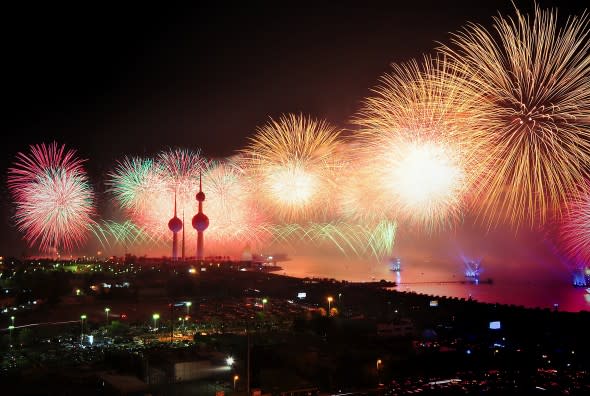How different cultures around the world celebrate the start of a new year
While most of the world celebrates New Year's Day on Jan. 1, there are many cultures that recognize the start of a new year on different dates.
Below are five New Year's cultural celebrations that occur throughout the year.
1) Lunar New Year - China
For 15 days, billions of people in China, as well as those from Asian countries including Indonesia and Vietnam, celebrate the Lunar New Year, also known as the Spring Festival.
It gets the name ‘Spring Festival' because the new year's first day marks the end of the most frigid part of winter, which means people can anticipate the start of the spring months.

It's celebrated at the turn of the traditional lunisolar Chinese calendar, which indicates both the moon phase and the time of the solar year.
"The date for the Lunar New Year changes each year," said Yi Wu, assistant professor of anthropology at Clemson University.
The new year's first day always falls on the new moon between Jan. 21 and Feb. 20, according to the Chinese lunar calendar, Wu said.
Each new year is named after one of 12 animals in the zodiac cycle. For instance, 2018 is the Year of the Dog.
Traditionally, celebrations run from the eve of the first day of the Lunar New Year to the Lantern Festival, which is held on the 15th day of the first calendar month and marks the festival's end.
2) Rosh Hashanah - Israel
Jewish people around the world celebrate the new year in September or October during Rosh Hashanah, which means "Head of the Year."
Rosh Hashanah is considered a time of rejoicing, introspection and celebrating the completion of another year. It's welcomed on the first two days of Tishrei, which is the seventh month on the Hebrew calendar.
The holiday is celebrated with traditions that include sounding the shofar, or ram's horn, in synagogue and eating foods like dates, leeks, beets and pomegranates.
Each food holds special meaning. For example, a popular Jewish tradition is eating honey-covered apples followed by prayer.
Ancient Jews believed that apples had healing properties and that the honey signified hope for a sweet new year.
Tashlich, a word with stems from the phrase "to cast" in Hebrew, is another custom of Rosh Hashanah.
Jewish people will walk to a body of water to shake out their pockets, symbolically casting their sins into the water.
3) Nowruz - Iran
For 13 days, about 75 million people in Iran and 30 million people in Afghanistan celebrate the rebirth of nature for Nowruz, which means "new day," at the start of spring.
Also known as the Persian New Year, it's one of history's most ancient celebrations, having been celebrated for about 4,000 years.
"It is celebrated just like Christmas in Germany," said Clemens Sehi, travel writer and creative director of travel magazine Travellers Archive.
"In Iran, families come together and give presents," Sehi said. "It is also almost like Black Friday [in the United States], because shopping is an important event and wearing new clothes a must."
A major part of the holiday is a deep cleaning about three weeks before the vernal equinox, during which homes are tidied and cleared of clutter to make way for a fresh start.
"The 13th day [of celebrations] is traditionally spent picnicking in the open air with all kind of pastries; this is supposed to take the bad omen of the number 13," Sehi said.
In Afghanistan, the festival lasts three days and is celebrated with dance, music and kite flying, he said.
4) Pahela Baishakh - India
Bengali people celebrate Pahela Baishakh in April, and celebrations are held on the first day of Baishakh, which is the first month of the Bengali calendar.
"This is at the beginning of the harvest season," Sehi said. "The Bengalis perform cultural performances and [have] feast days, while the Sikhs celebrate with singing, dancing and reciting from their sacred book."
"Shubho Noboborsho," which translates to "Happy New Year," is the traditional greeting for the Bengali New Year.
5) Diwali - India
This festival of lights is enjoyed by millions of Sikhs, Hindus and Jains all over the world.
Diwali celebrations coincide with the Hindu New Year, last for five days and are usually held between mid-October and mid-November, depending on the Hindu lunar calendar.
Different cultures celebrate Diwali for a variety of reasons; to Hindus, for example, it signifies a celebration of triumph of good over evil after Rama, the lord of virtue, returned to his kingdom following 14 years of exile.
Festive fireworks mark the occasion, and families share sweets and gifts and give to those in need.
Similar to the Persian New Year, homes are traditionally cleaned and new clothes are worn for the festival.
